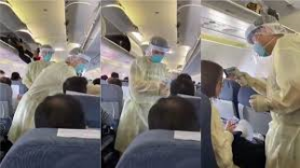Coronavirus ‘2019-nCoV’ infections – Operational Recommendations (OR)

Coronavirus ‘2019-nCoV’ infections – Operational Recommendations (OR)
Applicability: Aircraft Operators, Aerodrome operators and persons involved in a air transport operations

Ref. Publications:
Ministry of Health of Macedonia http://zdravstvo.gov.mk/
University Clinic for Infectious Diseases and Febrile Conditions http://www.infektivnaklinika.mk/
International Civil Aviation Organization (ICAO):
European Centre for Disease Prevention and Control (ECDC)
https://www.ecdc.europa.eu/en/novel-coronavirus-china
World Health Organisation (WHO)
https://www.who.int/ihr/ports_airports/locator_card/en/
https://www.who.int/emergencies/diseases/novel-coronavirus-2019.
https://www.who.int/ith/2020-27-01-outbreak-of-Pneumonia-caused-by-new-coronavirus/en/
Description:
Following the evolution of the Coronavirus ‘2019-nCoV’ outbreak in the city of Wuhan, People’s Republic of China (PRC), and based on the reports published by the WHO, ICAO , EASA and ECDC, CAA has issued this operational recommendations, providing recommendations to the Aircraft and Aerodrome operators in order to reduce the risk of spreading the ’2019-nCoV’ Coronavirus.
CAA is closely monitoring developments related to the Coronavirus outbreak in Wuhan (PRC) and is actively engaged with the WHO, ICAO, EASA, the European Commission (EC) and https://ec.europa.eu/info/departments/health-and-food-safety_en. Due to that, the latest guidance and recommendations issued by WHO, ECDC, EASA and ICAO should be considered in the context of this OR.
At this time, the safety concern described in this OR does not warrant the issuance of an operational directive under Regulation (EU) 965/2012, Annex II, ARO.GEN.135(c).
Recommendation(s):
The CAA draws the aviation community’s attention to information and guidelines provided by the WHO, ECDC, ICAO, IATA, EASA and Ministry of Health of Macedonia and University Clinic for Infectious Diseases and Febrile Conditions of Macedonia. In particular, the WHO recommendations for public health authorities and the transport sector, including operational recommendations for the case of passengers presenting symptoms compatible with an acute respiratory infection.
Aircraft and aerodrome operators should provide information to crew members and aerodrome staff regarding the management of a case with acute respiratory infection on board an aircraft.
Aircraft operators should provide crew with a lay-over in the PRC with the necessary information and materials as recommended by the Chinese authorities for their local inhabitants.
Aircraft operators performing passenger flights to or from the affected countries (see Note 1 of this OR.) should be equipped with one or more Universal Precaution Kits (UPKs). Such kits may be used to protect crew members who are assisting potentially infectious cases of suspected communicable disease and in cleaning up and correctly discarding any potential infectious contents.
Note 1: Affected countries are considered the PRC and other countries where human-to-human transmission of the 2019-nCoV coronavirus infection was confirmed without the history of travel to the PRC, in accordance with the latest https://www.who.int/emergencies/diseases/novel-coronavirus-2019/situation-reports/ as published by WHO.
Aircraft operators should encourage their staff and crew members to identify passengers meeting the following criteria: having signs and symptoms indicative of acute respiratory infections, and having been in the PRC or in direct contact with people arriving from the PRC within the last 14 days. In the event of such a symptomatic passenger being identified, the crew should be encouraged to:
- use the health part of the aircraft general declaration to register the health information on-board and submit it to the Point of Entry health authorities when required by a State’s representative;
- ask the passengers to fill in the passenger locator card forms in order to collect information regarding the passengers’ position in the aircraft as well as other information regarding their immediate travel plans and contact details. The information is intended to be held by public health authorities in accordance with applicable law and is to be used only for authorized public health purposes. A passenger locator form can be downloaded here https://www.who.int/ihr/ports_airports/locator_card/en/;
- recommend to the passengers to self-report if feeling ill, and if they meet the criteria mentioned above; and
- follow the basic principles to reduce the general risk of transmission of acute respiratory infections as presented by WHO in their Travel Advice https://www.who.int/ith/2020-24-01-outbreak-of-Pneumonia-caused-by-new-coronavirus/en/
Aircraft operators and aerodrome operators should collaborate as much as possible with the public health authorities in providing support in passenger tracing and epidemiological investigation in the event of flights where a Coronavirus ‘2019-nCoV’ infection has been confirmed.
Archive
- 09.05. Aviation safety promotion
- 20.10.  
- 14.11. CAA became a member of JARUS
- 14.11. CAA visit BHDCA
- 14.11. Promotional flight Dubai
- 14.11. MACEDONIANS OVERLY EUROPEANS
- 14.11. Attention
- 09.11. Kurban Bajrami
- 28.10. Certificate of Gratitude

